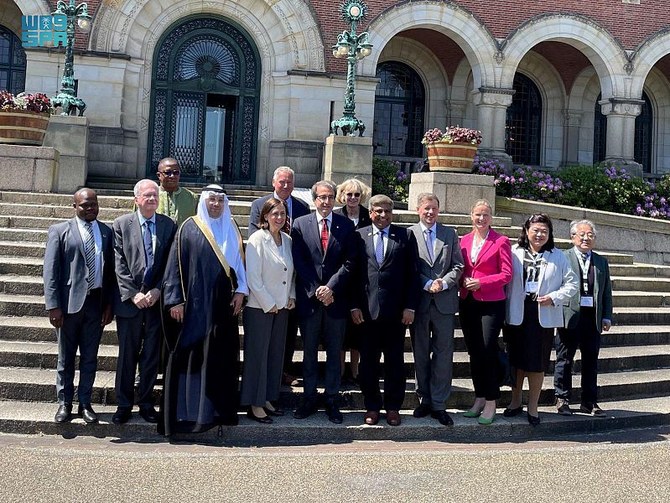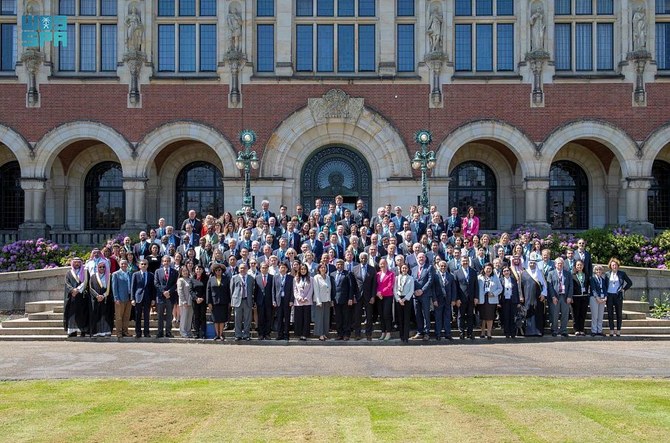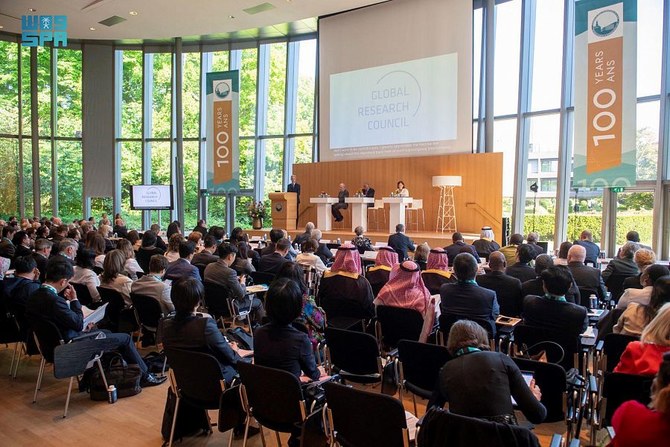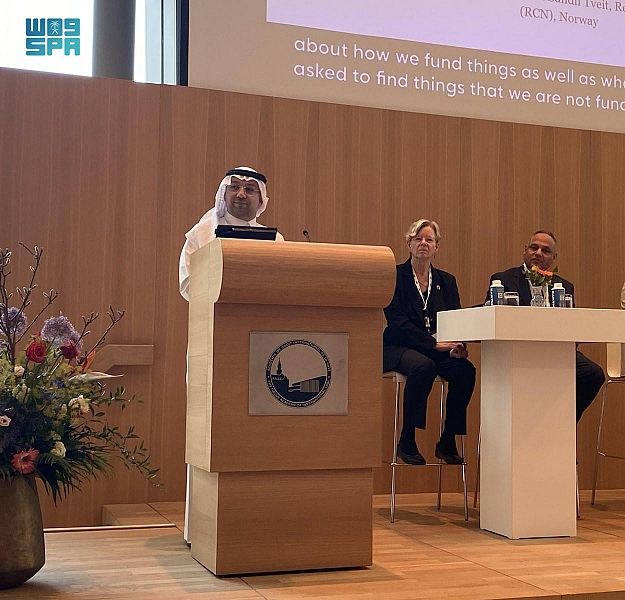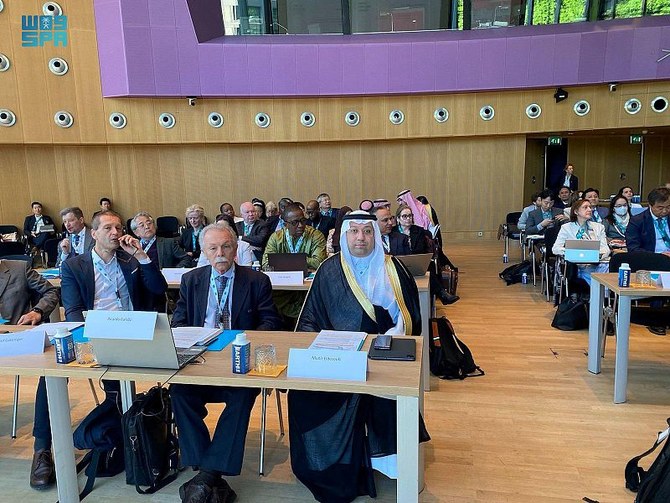RIYADH: Saudi Arabia has been re-elected to represent the Middle East and North Africa region on the governing board of the Global Research Council during its 11th annual meeting in The Hague, The Netherlands, the Saudi Press Agency reported on Saturday.
The President of King Abdulaziz City for Science and Technology, Dr. Munir Eldesouki, will continue to represent Saudi Arabia at the GRC and his re-election reaffirms the Kingdom’s prominent position in the scientific and research fields and its commitment to enhancing joint cooperation among research centers in the MENA region.
This achievement is also a testament to the unwavering support of King Salman and Crown Prince Mohammed bin Salman, who is head of the Higher Committee of Research, Development and Innovation.
During the annual meeting, which took place from May 29 to June 2, Eldesouki chaired a meeting of the heads of research councils from the MENA region and participated in a panel discussion on the funding of climate change research, in which the participants endorsed a statement to strengthen international cooperation, research outputs, scientific communication, financing strategies, taking into account social and economic conditions, local cultures and knowledge, capacity building in science, innovation and entrepreneurship, and identifying best practices.
Eldesouki, who is also the general supervisor of the founding team of the Research, Development and Innovation Authority, met with a number of heads of international research councils from Singapore, Canada, the US, Turkiye, Britain and Germany to discuss areas of cooperation on the sidelines of the annual meeting.
The Kingdom presented a working paper on the challenges and opportunities faced by the research councils in the MENA region and the delegation participated in a number of other key meetings, including the council’s executive committee, the international consultative committee, and the working groups concerned with equality, diversity and inclusion, responsible evaluation of research, and international multilateral funding.
Saudi Arabia has played a pivotal role in the GRC’s work since its establishment in 2012, including strengthening cooperation between research funding institutions, exchanging best practices and expertise in supporting scientific research, and exploring ways to support the scientific community across the world.
The Kingdom currently occupies the position of vice-chair of the GRC’s board of governors and also represents the regional research councils of the MENA region on the board, as well as on the executive committee.
Global Research Council re-elects Saudi Arabia as MENA region chair
https://arab.news/m96be
Global Research Council re-elects Saudi Arabia as MENA region chair

- The decision came during the 11th annual meeting of the Global Research Council in The Hague
- The Kingdom presented a working paper on the challenges and opportunities faced by the research councils in the MENA region
Saudi Arabia condemns suicide attack on Syrian church

- Syria’s health ministry said an attack on a church in Damascus on Sunday killed 20 people
RIYADH: Saudi Arabia on Sunday condemned a suicide attack on a church in Damascus that killed at least 20 people.
Syria’s interior ministry said in a statement that “a suicide attacker affiliated with the Daesh terrorist group entered the Saint Elias church in the Dwelaa area of the capital Damascus where he opened fire then blew himself up with an explosive belt.”
The Foreign Ministry emphasized the Kingdom’s position rejecting the targeting of places of worship, the terrorizing of civilians, and the shedding of innocent blood.
It affirmed the Kingdom’s support for the Syrian Arab Republic against all forms of violence, extremism, and terrorism.
Sisterhood club at full throttle on the road to freedom

- For many club members, motorcycles are not only a mode of transport, but also represent independence and the breaking of barriers
RIYADH: Young Saudi women are discovering a new freedom riding motorcycles on the streets of Riyadh, challenging stereotypes and fostering an empowering community.
The Sisterhood Motorcycle Club, with its all-female membership, is at the forefront of this trend.
Founded in 2022 by Capt. Saud Albarak and Roaa Talal Abualsaud, the club was born from a simple idea: to create a safe, inclusive space for women in Saudi Arabia to explore their passion for motorcycles.
“We wanted to break stereotypes and build a strong community that supports freedom, confidence, and sisterhood on and off the road,” Abdulsaud said.
This mission resonates deeply with women who have long felt restricted by societal norms and expectations, she added.
For many club members, motorcycles are not only a mode of transport, but also represent independence and the breaking of barriers.
Joining the club is an opportunity to step out of their comfort zones and embrace a lifestyle that celebrates adventure and camaraderie. The club seeks to encourage women to embrace their passions, while providing a supportive network for those who seek to share this journey.
Abualsaud, a dentist and proud biker, explained her motivation for co-founding Sisterhood. “I wanted to create a space where women could feel both powerful and supported,” she said.
“As someone who always seeks adventure, riding became my way of feeling free and present. Building and leading this club wasn’t just about motorcycles — it was about making a statement that women can be bold, united, and unstoppable.”
Sisterhood membership is open to all women, regardless of their experience with motorcycles.
“Owning a bike is not required to join. We welcome women at all levels, whether you’re an experienced rider, someone considering getting a license, or simply curious about the community,” Abdulsaud said.
This inclusive approach makes it easier for women to join without feeling intimidated, fostering a sense of belonging.

“I’ve always been passionate about adventurous hobbies. I ride horses and have loved ATVs (all-terrain vehicles) since childhood. So, when women were allowed to ride motorcycles, I jumped at the opportunity,” said club member Maisa Alhugaily.
“What drew me specifically to Sisterhood Club was the sense of community and empowerment it offers. I wanted to be part of a group that supports and uplifts women, while exploring something exciting and different.”
The club provides mentorship, safety training, and introductory riding experiences to ensure that new members can embark on their journeys with confidence.
“What matters most is the spirit of adventure and respect for the community,” Abdulsaud said. This commitment to safety and education helps demystify the world of motorcycles, making it accessible to everyone.
The importance of such clubs for Saudi women cannot be overstated, she believes.
“These clubs give Saudi women visibility, voice, and validation in spaces traditionally dominated by men. Riding a motorcycle in Saudi Arabia is more than a hobby — it’s a symbol of choice, strength, and movement.”
Sisterhood empowers women by offering them opportunities to lead, connect, travel, and inspire each other.
This empowerment is crucial in a society where women are often expected to conform to traditional roles. The presence of female riders challenges stereotypes and encourages other women to explore their interests without feeling limited by societal expectations.
“It also helps normalize the presence of female riders in public, creating a ripple effect for future generations of girls to dream big without limitations,” Abdulsaud says.

Currently, Sisterhood organizes over 40 rides and has 260 active members from cities across Saudi Arabia. The community is steadily growing, with regular collaborations with riders from other Gulf countries.
Abdulsaud said: “Sisterhood is not just a local club — it’s part of a larger movement.” This expansion reflects the increasing interest among women in pursuing activities that defy traditional gender roles.
In addition to riding, the club engages in various events and interests that foster camaraderie and personal growth.
“We participate in local and regional motorcycle events, organize safety awareness workshops, community outreach rides, and even lifestyle gatherings like motorcycle fashion events, fitness classes, and off-road trips,” Abdulsaud said.
The wide range of activities encourages a lifestyle filled with empowerment, connection, and fun.
Through the Sisterhood Motorcycle Club, Saudi women are not only discovering a passion for riding, but also building a supportive network that champions their dreams and aspirations. The club embodies a spirit of unity and strength, allowing women to pursue their passions unapologetically.
“We’re telling them, you have a place among us,” Abdulsaud said.
The Sisterhood Motorcycle Club is more than just a group of women who ride; it is a movement that signifies freedom, empowerment, and sisterhood. As these women continue to break barriers and redefine their roles in society, they are paving the way for future generations to ride boldly into their own destinies.
Saudi interior minister meets outgoing UK ambassador in Riyadh

- Neil Crompton will be succeeded by Stephen Hitchen
- Crompton described Saudi Arabia as a ‘key, indispensable partner’
LONDON: Saudi Minister of Interior Prince Abdulaziz bin Saud bin Naif met Neil Crompton, the outgoing UK ambassador to Riyadh, in his office on Sunday.
Crompton bid farewell to Prince Abdulaziz as his tenure as ambassador ended. Prince Abdulaziz thanked Crompton for his service in the Kingdom and wished him success.
Crompton will be succeeded by Stephen Hitchen.
In a previous interview with Arab News, Crompton described Saudi Arabia as a “key, indispensable partner” to the UK.
“We have a shared history, and part of our shared history is recognition that Saudi Arabia is a key diplomatic partner, not just in the Arab world, but in the Islamic world. I think it has a neutral ability to bridge gaps both between east and west, and north and south,” Crompton said.
Saudi transport minister wraps up visit to Russia and France

- The visit aims to strengthen cooperation between the Kingdom and Russia and France in the fields of transport and logistics
RIYADH: Saudi Minister of Transport and Logistics Services Saleh Al-Jasser was recently on an official visit to Russia and France along with his accompanying delegation of officials from the sector.
He participated in the opening of the St. Petersburg International Economic Forum and its main session, which was also attended by Russian President Vladimir Putin, the Saudi Press Agency reported on Sunday.
In France, Al-Jasser attended the opening of the International Paris Air Show as well as a signing ceremony for an air services agreement between Saudi Arabia and Panama.
The visit aims to strengthen cooperation between the Kingdom and Russia and France in the fields of transport and logistics.
Saudi project clears 1,243 mines in Yemen

- The demining operations took place in Marib, Aden, Jouf, Shabwa, Taiz, Hodeidah, Lahij, Sanaa, Al-Bayda, Al-Dhale and Saada
RIYADH: Members of Saudi Arabia’s Project Masam removed 1,243 explosive devices from various regions of Yemen last week.
The total included 1,182 unexploded ordnances, 57 anti-tank mines and four anti-personnel mines, according to a recent report.
Ousama Al-Gosaibi, the initiative’s managing director, said that 501,243 mines have been cleared since the project began in 2018.
The explosives were planted indiscriminately and posed a threat to civilians, including children, women and the elderly.
The demining operations took place in Marib, Aden, Jouf, Shabwa, Taiz, Hodeidah, Lahij, Sanaa, Al-Bayda, Al-Dhale and Saada.
The project trains local demining engineers and provides them with modern equipment. It also offers support to Yemenis injured by the devices.
Teams are tasked with clearing villages, roads and schools to facilitate the safe movement of civilians and delivery of humanitarian aid.


